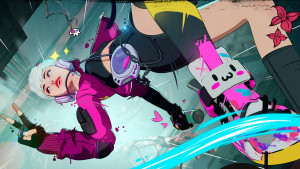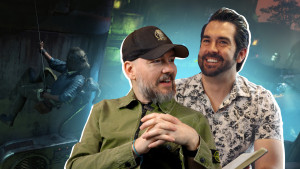Please support Game Informer. Print magazine subscriptions are less than $2 per issue
The Virtual Life – Why The Outsider Is One Of Gaming's Greatest Characters

Note: This includes spoilers for all of the Dishonored series, including Death Of The Outsider.
Since the first Dishonored's release back in 2012, I've maintained that Arkane's fantastical immersive sim series is the most humanistic work in the massive-budgeted video game space. Across five entries (including DLC and standalone expansions) there is one continuous struggle that defines both Dishonored's theme and design, intertwining those two elements with a particular kind of grace. A large part of why that combination works so well is because of Dishonored's most compelling character: The Outsider.
The Outsider is a semi-religious figure, regarded with fear, suspicion, and respect. He is described as "a figure of myth, neither good or evil," who exists on the edges of reality, granting those he deems worthy special powers. For many players, and characters in the game, people take The Outsider as a trickster god, one who thrives on sadistically introducing chaos into a morality-free universe. Creative Director Harvey Smith has long pushed back against this notion. However, the ambiguity in The Ousider's character and the lack of explanation for his motives has made this a fairly understandable interpretation, which is why Death Of The Outsider's revelations finally explaining his motivations for doing what he does are both welcome and a great note to end on.
After being the victim of a cult's sacrificial ritual when he was just a mortal, The Outsider found himself strapped to The Void, a universe that exists on another plane outside, constantly dreaming. When we find The Outsider, he's not walking around on shifting platforms, chuckling, but is instead clearly tortured and tied into place, half-awake, half-dreaming, a victim of trauma trapped in a catatonic state. And at long last, after countless hours roaming around with his gifts and causing whatever havoc we wanted, we have his throat at the mercy of our blade. It in this moment, when the final binary choice of the series (thus far) is presented to us, that Dishonored comes together as a beautiful, cohesive whole in a way that most games simply do not.
Dishonored, by its nature as an immersive sim, embraces adaptability and choice, letting players choose how they tackle obstacles. This is not a thing Dishonored invented, of course. Deus Ex, System Shock, Thief, and several other older titles were developed with those flexible tenets in mind. However, Dishonored is special because it thematically embraces that design throughout all of its entries, couching the freedom of choice in the binary of forgiveness versus resentment. Dishonored does this in a very clever way too. Revenge is almost never justified to someone as revenge. There's always some other element wrapped up in it, some notion of practicality. In the first game, Corvo's revenge is also presented as an opportunity to put Emily Kaldwin, his daughter, back on the throne. In the second game, it's about Emily/Corvo regaining their kingdom after Delilah steals it away. In the various DLCs, revenge is also presented as something else, with Daud and Billie trying to make amends for their sins. In Death of the Outsider, both Daud and Billie are aging assassins, Daud himself on death's door, and both of them have regrets. To kill the Outsider isn't just about revenge. It's supposedly about absolution and preventing The Outsider from introducing more chaos in the world.

But is it? Or are these just things our would-be heroes and heroines tell themselves to justify bloodshed and indulging in their darkest, most violent fantasies. The Outsider is not a trickster. He's not cruel, not conventionally. He is curious. And he has power. "How you use you what I have given you falls upon you, as it has other people before you," he tells Corvo upon their first meeting. "And now, I return you to your world, but know I will be watching with great interest." In the end, The Outsider serves as an embodiment of what Dishonored is all about: an intersection between our choices and our identity, a celebration of the flexible design of immersive sims themselves, and the responsibility that comes with great power. The story of Dishonored is just as much his story as it is Emily, Corvo, Daud's, and Billie's. And the background story for him, finally revealed in full during The Death Of The Outsider, establishes the context for why he does what he does. And it's a very effective and even slightly moving context, a much more persuasive justification for his motives than I was expecting. If I were strapped for countless years in some space, walking through dreams, capable of only granting people power and observing them from afar – would I not do the same? Out of boredom. Out of resentment. Out of a desire to see my perception of the world reinforced (while secretly hoping it is challenged).
In the end, with knife in hand, Death Of The Outsider lets us decide whether we forgive him and, with the powers at our disposal, return him to the land of the living and let him get the chance to live free as a mortal, or we do the other thing. The thing I did. The knife into the heart. Finishing things once for and all, despite feeling sympathy for his position. Nice, tidy. Nothing left to chance. No more Outsider. No more gifts. Just the fire and chaos that humanity brings on itself.
Why did I do it? Why hate over mercy?
Fittingly, as the credits rolled I spent a lot of time trying to justify it in my own way (as you do when you do something awful). It was thematically relevant to the way I had played through all of Dishonored: violent and unforgiving, a whirlwind of blade and blood. It was a practical solution. I wanted to know what it was like to kill a god. Perhaps it was a more merciful thing, to lay him to peaceful sleep rather than have him live among humans. Blah blah blah blah. In the end, despite all the reasons and justifications, I just wanted to watch him die. And I did. And it felt good. But I guess he won out in the end, really. Across every single entry in the series, I had the option to fight against his notion of people as awful, terrible creatures that will burn the world down given the right amount of justification and chose not to, becoming an embodiment of every single dark thing he had to say about mankind. It was an affecting moment, going through those reasons, and one that speaks to just how much I adore Dishonored and Arkane's incredible ability to immerse us in the rich worlds it creates.
The Outsider no longer walks among us. Rest in peace, you black-eyed devil.
For more on Dishonored, you can read our review of Death Of The Outsider and my greatest games post on the original here.










